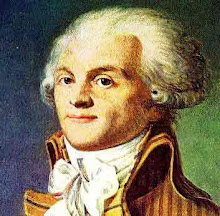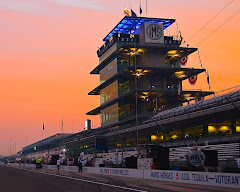Let us examine some specific points of criticism and assess their relative validity. Some of Wicker Bill's insights are better than others; is this not true for us all?
"Indy Idea blogger Roggespierre - I'm sure this is some sort of cleverWicker Bill is apparently not alone in that regard.
pun about the 18th century French master of the guillotine Maximilien
Robespierre, but I don't get it..." - Wicker Bill
Therefore, why Roggespierre?
1. Because heads have been rolling at the IMS and IRL administrative offices this year.
2. Because factional rivalry has thrown IndyCar racing into a state of perpetual and destructive revolution that has produced many economic carcasses and no market winners.
3. Because citizens tend to want the heads of IndyCar leadership without having a viable alternative at the ready.
4. Because I like the way it sounds.
"Roggespierre is clearly someone who wants most or all IndyCar races to be
run on ovals and allows this bias to influence his rhetoric." - Wicker
Bill
Wicker Bill's conclusion is correct. I do want most IndyCar races to be on ovals. I believe that the market for oval racing in the United States is much greater than the market for road and street racing. I want IndyCar to offer a racing product that the mainstream U.S. market will accept. I focus on the U.S. market because the Indianapolis 500 remains, at least to some degree, an iconic institution in its home nation.
I believe that a majority of racing spectators in the United States will not embrace an international, road racing product, no matter how outstanding that product might seem to those who like it.
I happen to enjoy sports car racing more than NASCAR racing. I thought that CART's North American Touring Car Series was outstanding. I was sorry to see it go. However, I also recognize that I am not at all representative of U.S. motorsports consumers at large in that regard. I believe that adults do well when they are honest with themselves.
"The blog entry begins by calling (Mike) King “a company man,” suggesting that his
statement that the attendance at Chicagoland, Kansas and Kentucky was poor this
year, and the attendance at St. Petersburg, Long Beach, Edmonton and Mid-Ohio
was good is because IndyCar told him too." - Wicker Bill
I respectfully request that Wicker Bill examine Mike King's public statements of seven or eight years ago. Compare them with his statements today. Then, explain where I got it wrong.
Wicker Bill commits a factual error that is fully confirmed by the record. I did not suggest that King challenged Pistone because "IndyCar told him to." I also do not believe this to be true.
Nobody has to tell Mike King what to say about IndyCar racing. He works there. King is fully incentivized to defend and support his bosses whenever he chooses to comment publicly. Therefore, my suggestion, in effect, was that Mike King is not a self-immolating moron. Why this is an object of controversy is beyond comprehension.
"Why would IndyCar, using King as a proxy, want to discredit three tracks
at which it will be racing at for the foreseeable future? Hell, Hulman & Co.
owns half of Chicagoland." - Wicker Bill
That is an outstanding and insightful question, one for which I have no answer. Perhaps Wicker Bill should ask Mike King. Perhaps I should, too. In this case, King's proclamations seem misaligned with the interests of both himself and his firm. I credit Wicker Bill for shining the light on this one.
Incidentally, Hulman & Co does not own half of Chicagoland. International Speedway Corporation purchased Raceway Associates (IMS was a partner) in 2007. I do ask that, if you must criticize, then kindly have the facts in order.
We shall continue this dialogue soon enough.
Roggespierre








